 |
| Background of COE of Integrated Area Studies/ Objectives of the program/ Expected outcomes of the program/Looking ahead to the future |
 |
| Program title |
Aiming for Center Of Excellence of Integrated Area Studies:
Establishing Field Stations in Asia and Africa to Combine Research Activities and On-Site-Education |
| Institutions in charge |
Graduate School of Asian and African Area Studies (ASAFAS), Kyoto University
Center for Southeast Asian Studies (CSEAS), Kyoto University |
| Key words |
Field stations, Area Studies Information Center (Area Info), Transdisciplinary
approaches to area studies, Common research theme "Human-Nature
Coexistence in a Glocalizing World", Global Network for
Area Studies, Comparative area studies |
|
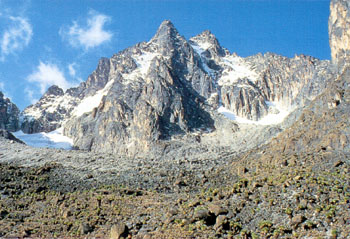 |
 Background of COE of Integrated Area Studies Background of COE of Integrated Area Studies
1) Contextualizing the program within Kyoto University's academic heritage
One of the academic traditions of Kyoto University has been
its emphasis on "positivism on foot," best represented by
Kinji Imanishi's anthropological research in Africa and Hitoshi
Kihara's expeditions to Karakorum-Hindu Kush. Both of these
activities sought a new paradigm through fieldwork in the
non-European world. Kyoto University recently announced its
decision to embrace the concept of "Harmonious Coexistence
of the Global Community" as the university's guiding moral
principle of the 21st century. The present program, adopting
"Human-Nature Coexistence in a Glocalizing World" as the common
research theme of the program and promoting integrated area
studies based on fieldwork in Asia and Africa, thus embodies
and puts into practice the spirit of Kyoto University's academic
traditions and new moral principle.
2) Importance of integrated area studies
We are at the beginning of the 21st century, and the world
is in the process of rapid globalization in terms of economy
and information flows. Numerous problems require urgent action.
More than ever we need to tackle the disparity in North-South
relations. Environmental problems requiring swift solutions
confront us at every turn. Ethnic conflicts and regionalism
are frequent occurrences. Many of these problems, although
manifested globally, are, in their fundamentals, localized
expressions of collisions between tradition and modernization,
regionalism and globalization. Yet, we have so far failed
to come up with a new paradigm which may allow the coexistence
of these divergent forces currently working at cross-purposes
in a glocalizing world.
The problems mentioned above are most salient in developing
areas, above all in tropical Asia and Africa. These two areas
with distinct histories and cultures are molded out of their
environments and through interactions with surrounding areas.
They are now at an important historical turning point, and
events in Asia and Africa in the next decade or so will greatly
influence the shape of the world order in the 21st century.
At this particular historical juncture we must contribute,
both as citizens and scholars, to the establishment of a new
world order in which the sustainable development and coexistence
of different areas of the world, including Asia and Africa,
are realized. With this difficult but worthy purpose in mind
we hope to promote transdisciplinary and integrated approaches
to area studies which transcend the existing disciplinary
boundaries and lead to better and more holistic understanding
of divergent areas in the world. Moreover we aspire to carry
out this endeavor with a perspective of comparative area studies
so that our understanding is both situated within particular
local contexts and conducive to comparisons between different
parts of Asia and Africa.
|
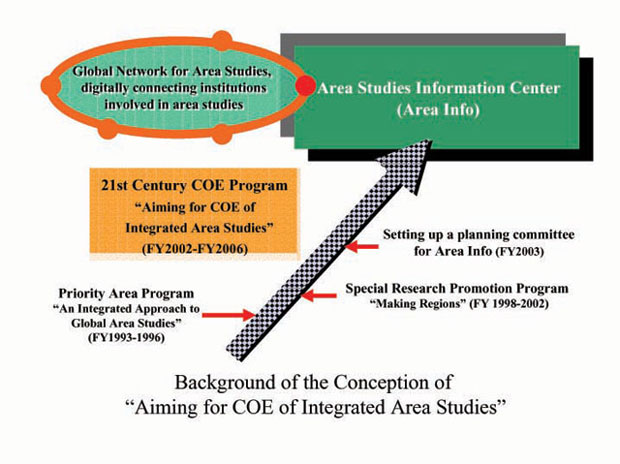 |
 Objectives of the program Objectives of the program
Two institutions of Kyoto University are involved in the program: the Graduate School of Asian and African Area Studies (ASAFAS) and the Center for Southeast Asian Studies (CSEAS). Both have been leading centers of area studies in Japan. In recent years they have carried out two large-scale programs on area studies funded by MEXT (Japanese Ministry of Education, Culture, Sciences and Sport). They are Priority Area Program "An Integrated Approach to Global Area Studies: Striving for Coexistence between the Earth and Areas" (FY1993-1996) and COE Program "Making Regions: Proto-Areas, Transformations and New Formations in Asia and Africa (FY 1998-2002).
We now aim to build upon these foundations post-graduate level education in area studies by integrating research activities and on-site-education. We will at the same time advance research activities and information dissemination on socially relevant issues in the contemporary world, thereby striving to fulfill our missions in the fields of education, research and social contribution. There are four main components in our 21st Century COE Program which help us attain the program's objectives.
|
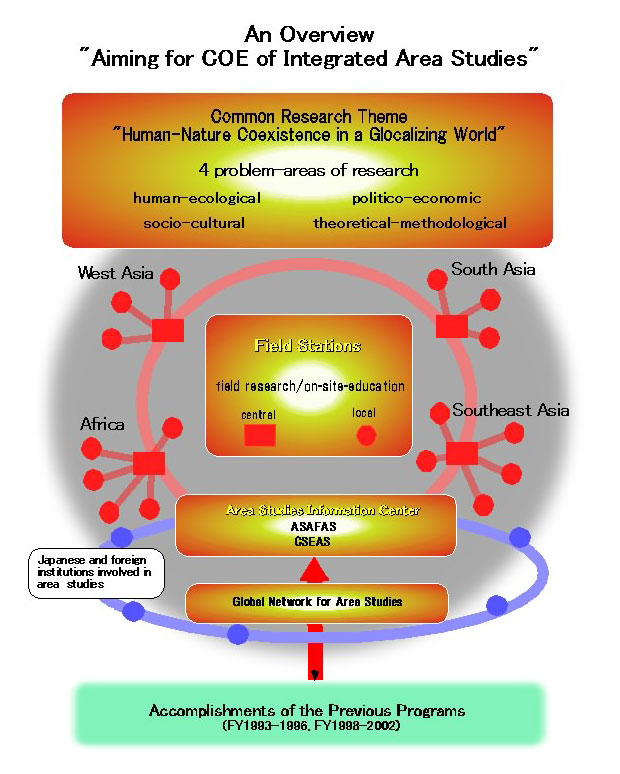 |
1) Setting up the common research theme "Human-Nature Coexistence in a Glocalizing World"
The common research theme provides a framework for addressing issues of global concerns through integration of natural and social sciences approaches. The theme explicitly recognizes the interactions between human and natural systems at multiple scales from global, through regional to local.
The common research theme encompasses four problem-areas of research, namely: human-ecological, socio-cultural, politico-economic, and theoretical-methodological. Indicative examples of research topics corresponding to each of the four problem-areas of research include:
Human-ecological:
environmental conservation, re-evaluation of indigenous agricultural practices, introduction of family planning, etc.
Socio-cultural:
religious conflicts, migration and inter-ethnic relations, social consequences of the aging of society, etc.
Politico-economic:
economic development, regional autonomy, political economy of democratization, etc.
Theoretical-methodological:
methods of area studies, methodology of transdisciplinary approaches to area studies, etc.
Research activities and on-site-education funded by the program are carried out within the framework of the common research theme so that research results of the program can be aggregated with coherence and simultaneously comparable along particular problem-areas of research across Asia and Africa.
2) Establishing a dozen or so of field stations in Asia and Africa:
Field stations are meant to serve as bases for research activities and on-site-education. They are established in cooperation with local universities or research institutions in Asia and Africa under MOUs (Memorandum of Understanding). Field stations are also expected to function as portals of information exchange and faculty/student exchange between ASAFAS/CSEAS and their counterparts abroad. CSEAS's liaison offices in Jakarta and Bangkok too are to fulfill the function of field stations in their respective regions.
3) Establishing Area Studies Information Center or Area Info:
We are establishing an Area Studies Information Center (nicknamed Area Info), to be launched in 2003, in order to collect and circulate various types of information such as printed, audio-visual, remote-sensing and other materials. This center will support research activities and on-site-education via the field stations. The COE program will strengthen this effort by providing funds to hire specialists and to purchase digital equipment.
4) Launching a Global Network for Area Studies:
With the Area Studies Information Center as a hub, we plan in FY2005 to launch Global Network for Area Studies, digitally connecting educational or research institutions involved in area studies, both in Japan and abroad. It is hoped that Global Network for Area Studies will make a substantial contribution to the global circulation of information on socially relevant and pressing issues.
|
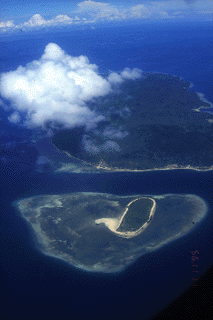 |
 Expected outcomes of the program Expected outcomes of the program
Among other things, we hope to achieve the following outcomes through the program.
1) Integration of research activities and on-site-education
Faculty members and their students under the program carry out research activities and on-site-education with the field stations as bases of their activities. They are also expected to concentrate on one of the problem-areas of research within the framework of the common research theme. Through these arrangements it is hoped that we will be able to train students more adequately in fieldwork and have them exposed to various current issues which Asia and Africa face.
2) Development of transdisciplinary approaches to area studies
Most of the pressing issues in the contemporary world are multi-faceted in nature and origin. A fundamental pitfall of modern sciences is that they tend to exclude the viewpoint of either social sciences or of natural sciences in approaching these issues. The design of the program explained above should help make transdisciplinary approaches to area studies more practicable by promoting the collaboration between social scientists and natural scientists in the field in a focused manner.
3) Area Studies Information Center
Through the establishment of the Area Studies Information Center and the Global Network for Area Studies, we will be able to promote integrated area studies even after the program is over. The Global Network for Area Studies in particular is also expected to serve as a non-hegemonic information channel which ensures "democracy" in the access, input and dissemination of information among its participating institutions. One good example of "democratic" input in the database construction is Aflora, an African ethno-botanical data base (URL: http://130.54.103.36/aflora.nsf) at ASAFAS.
|
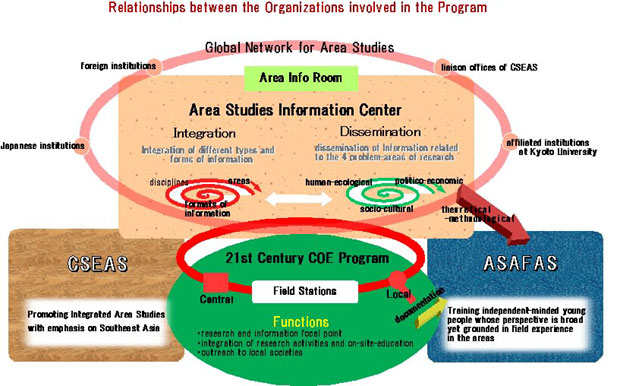 |
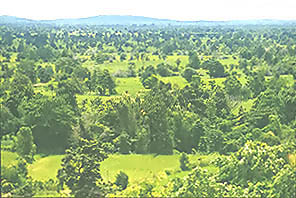 |
 Looking ahead to the future Looking ahead to the future
The 21st Century COE Program will run for five years and end in FY2006. This
does not mean, however, that our efforts for further strengthening the COE
of integrated area studies will cease thenceforth. On the contrary, we hope
to carry our COE to a higher level of excellence after the termination of the
present program. As steps toward that goal, we have the following plans in
mind.
1) Ensuring outcomes of the 21st Century COE Program
On-campus education in area studies will benefit from experience gained through on-site-education by making use of materials collected through the documentation of activities at the field stations during the five-year program.
By applying for and securing competitive funds, we will maintain some of the field stations under the current program and, if necessary, establish new ones so that we can continue the integration of research activities and on-site-education in correspondence with changing times and needs. It is expected that the management and maintenance of field stations will eventually be handed over to local institutions
Through education that emphasizes "positivism on foot" and transdisciplinary approaches to area studies, we hope to train independent-minded young people whose perspective is broad yet grounded in field experience in the areas, the sort of people that are needed in the local community as well as the global community of the 21st century.
2) Consolidating the Area Studies Information Center or Area Info
The Area Studies Information Center will continue to play a central role in the facilitation of research activities and on-site-education, and in the functioning of the Global Network for Area Studies. The Area Studies Information Center will have two divisions: one will be for Area Information Processing, the other for Information Network Development together with Area Info Room. It is imperative to have the center consolidated and institutionalized within Kyoto University. Without recourse to annual budgetary allocations from the university, it will lack secure financial footing. We will work hard to accomplish this goal during our first six-year "mid-range objectives/mid-range planning" period (FY2004-FY2009).
3) A step forward to the future
After the termination of the 21st Century COE Program, we will conceive a
new large-scale program that emphasizes the integration of research activities
and on-site education, and transdisciplinary and comparative approaches to
area studies. In selecting the next common research theme, we will try to pick
one which can be tied in with the present theme, that is, "Human-Nature Coexistence
in a Glocalizing World" and which also makes good use of distinct research
traditions of ASAFAS and CSEAS. One possible theme for FY2007 could be "Sustainable
use of natural resources in Asia and Africa."
|
|

